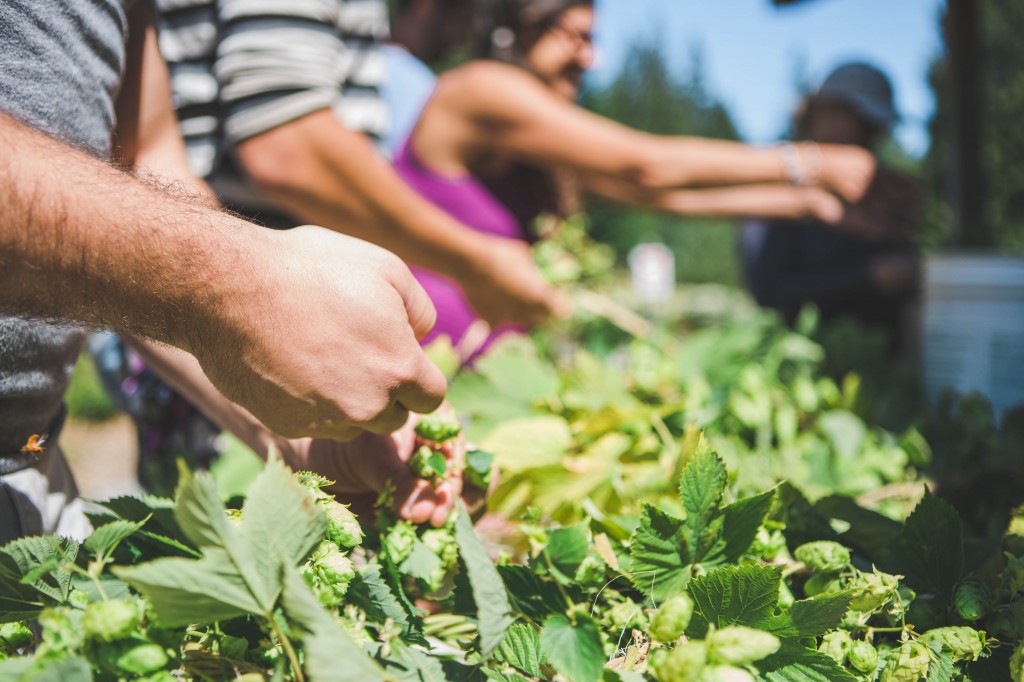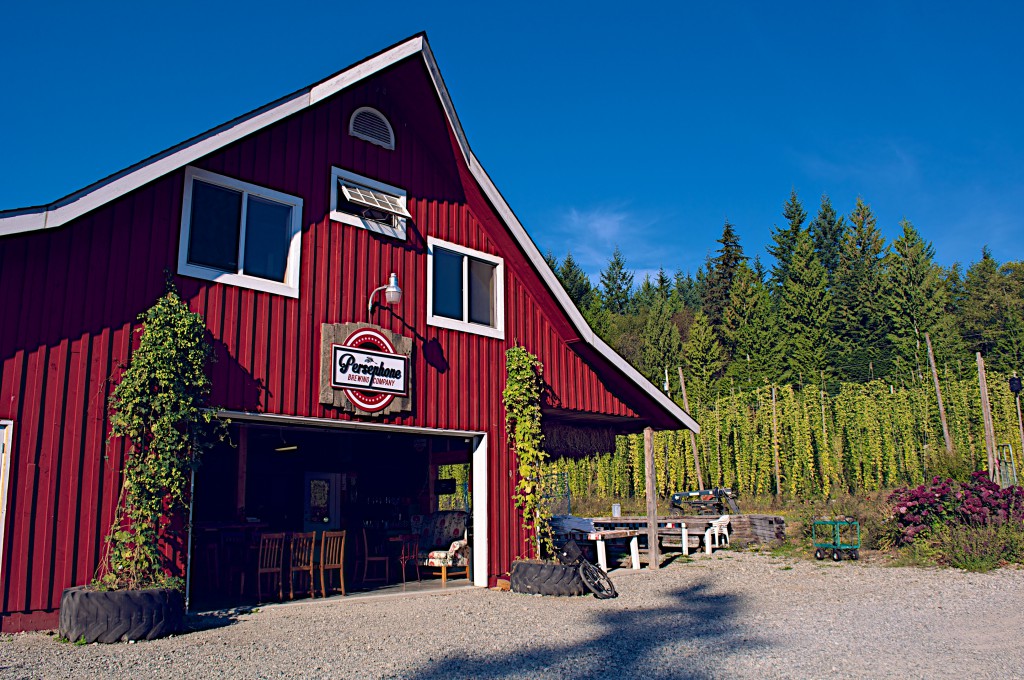The fertile Fraser Valley and Vancouver Island were once abundant in hop farms; in fact British Columbia was the largest hop-growing region in the British Commonwealth in the 1940s.
Since megabreweries squeezed out smaller companies decades ago, it has been the passion of a community of dedicated artisans that revived the local BC craft brewing scene and re-ignited interest in farming the fragrant, herbaceous perennial vine.
With over 80 commercially grown varieties of hops, countless grain and flavor additives, multiple style families and flavour categories, there are plenty of opportunities for market growth. Competition is both friendly and fierce between brewers and growers who want security and stability through the supply chain.
BC growers know that if they want to compete with conventional hop suppliers from places like Yakima Valley and Europe—known for consistent quality crops—they must collaborate with one another, build on valuable connections with the brewing industry, and master the ancient art of growing hops.
The Growing Fields
 Samuel Glasgow, field manager for Valley Hops and graduate of the University of the Fraser Valley’s agriculture program, says, “Hops is an intensive crop. I heard a German saying recently, that ‘a hop will see its master every day.’ It’s not like hay—plant it and let it do its thing. You have to be in the field every day from early spring until clean up in the fall.”
Samuel Glasgow, field manager for Valley Hops and graduate of the University of the Fraser Valley’s agriculture program, says, “Hops is an intensive crop. I heard a German saying recently, that ‘a hop will see its master every day.’ It’s not like hay—plant it and let it do its thing. You have to be in the field every day from early spring until clean up in the fall.”
Valley Hops has grown five times since 2015, so Glasgow spends more time managing other field managers, tracking pests, monitoring the integrated pest management program, and writing field reports for other farmers considering hops as a crop.
“I take soil samples, research the area and historical data maps, and then report on whether their land can be used for hops,” he says.
Glasgow is also on the board of the newly formed BC Hop Growers Association (BCHGA).
“Hop farmers are going to need more access to generational information through associations,” Glasgow stresses. “When it comes to finding out what time of year you need to put the twine in the ground or how you put your field to bed for winter or ready it for spring, the point of the association is to facilitate new farmers in those regards.”
BCHGA President Raymond Bredenhof of Bredenhof Hop Farms says that almost anyone can find a plot of dirt and put up some poles, but research is needed to succeed as a hop grower. Bredenhof is discovering all about the microbes in the soil, and mildews and insects that can infest the bines. His biggest mistake was that the weeds got away from him the first year and he plans to be more diligent about weed control. Watering is crucial too—hops like water, but don’t like their roots to be wet.
The encouragement and support among hop farmers is already evident. Glasgow says, “I believe it’s a trickle-down effect from the brewing industry itself. You see a lot of collaborations among brewers, and the brewers want to come out and see the fields and smell the hops—we are a small community and need to work together.”
Hop Distribution & Processing
 Bredenhof will sell the majority of his crop to Chilliwack Hop Farms, a co-op model operation—one of many in BC—which will dry, package and distribute to local brewers.
Bredenhof will sell the majority of his crop to Chilliwack Hop Farms, a co-op model operation—one of many in BC—which will dry, package and distribute to local brewers.
John Lawrence of Chilliwack Hop Farms has 200 acres planted and sells to several breweries throughout BC. Lawrence credits the farm’s success to hard work and the assistance he received from experienced hop farmers and veteran brewers who mentored him along the way.
Recapturing local knowledge is what Dwayne Stewart of BC Hop Company found helpful in learning about growing hops and being able to pass on information to others as well.
BC Hop Co. also adopted the co-op model, which works well as agricultural land prices soar, and there are smaller farms looking for alternative revenue streams.
“The trick is to get up to economic volume as quickly as possible. Our target is to sign up more partner farmers and to harvest 120 acres by October 2017,” says Stewart. “The partners provide land and capital for the hops installation, and we provide the expertise for planting, growing, as well as processing and marketing through BC Hop Co.”
Preserving the essential hop oils is critical for a fresh, premium product, and that requires speed. Getting the hops from the field, through the pelletization process and into cold storage before any of the quality is lost takes precision and timing.
BC Hop Co. recently completed construction on a world-class hop processing facility to get the oil-filled, cone-shaped flowers from bine to storage in record-breaking time.
Stewart states, “You have to rise to the level of the international supplier, and BC is not yet well-positioned to pick up the gauntlet. It’s really a re-start while we gather information on how to grow and process a commercially successful crop which will be fully embraced by professional brewers.”
Hop Growers Associations
Bredenhof and a few other growers are working on increasing membership to the BC Hop Growers Association which will soon have an internet presence and they can begin organizing more events.
“Having an association for growers is key to a strong industry,” Bredenhof states, and encourages interested farmers to connect with him through the Bredenhof Hop Farms Facebook page.
“There are many different specialties within hop farming,” Bredenhof says, “and a large part of what I want to do is put on seminars and workshops for potential growers, and I will be learning right alongside them.”
Bredenhof is also looking into insurance for hop farmers. And Bredenhof points out there are only 30 or 40 registered chemicals for hops as it is still a minor crop for Canada.
“We can lobby on behalf of farmers to approve new tools in our toolbox,” Bredenhof explains.
“There were a lot of very helpful people as I did my research, and I’ve tried to pay that forward which is what the association is all about. People can learn about hops and if they want to do it and how they want to do it.”
In 2014, over on Vancouver Island, Maple Bay Hop Farm owner Ben Reeder and his partner Jordan Cain dug the post holes, strung cables and unraveled twine to plant over five acres of organic varietals on land once used to farm hay and tend sheep.
Maple Bay now provides hops to local island breweries and Reeder is passionate about connectivity to the earth as well as other growers and brewers. “Having a hop source close by means brewers get fresher hops with less impact on the earth,” he says. “Transportation and storage of dried hops takes a toll on the environment.”
After attending an agriculture fair in Cowichan Valley, Reeder and Cain spoke with other growers frustrated with finding suppliers willing to trade essential items like coir (coconut fibre string for training hop bines) to smaller operations. They formed the Vancouver Island Hop Growers Association (which is not yet official) as a way to combine forces and resources.
“We harvested our fresh hops this year with the help of Cedar Valley Hop Farm and we traded labour for use of their Wolf harvester and oast house,” says Reeder.
“We did collaborations with Strange Fellows Brewing—a fresh hopped pale ale to be featured at the BC Hop Fest—and Luppolo Brewing, both in Vancouver,” adds Reeder. “We have also worked with fine dining restaurant Medina Cafe who is making a mango hop soda. A hoppy kombucha is also in development with another brand, Culture Craft Kombucha.
Brewmasters United
Sharing wisdom, lobbying on behalf of growers and brewers, and creating opportunities to build relationships are essential supports that hop grower associations and brewer guilds offer members.
Ken Beattie, Executive Director of the BC Craft Brewers Guild states, “There are over 80 member breweries and brew pubs in the guild right now and growing. They have to own a manufacturing license and be producing their own beer.”
“There’s only a certain number of brew styles, but it is the individual interpretations that make the industry so creative,” Beattie says. “Brewers are like chefs to me; they use traditional recipes—German-style beers, or English ales—and put their West Coast spin on it. With hops grown in the Fraser Valley, they can really add a local flavor.”
The guild provides valuable opportunities and tools for brewers and is focused on promoting unique brews from BC—known as the birthplace of craft beer in Canada.
Beattie describes how some brewers use other brewers’ facilities during expansion or relocation which is typical of the comradery among competitive small breweries.
“I come from big breweries, and the competition was intense. As the craft industry grew, the craft brewers’ point of difference has always been this sense of community. You go to festivals and see the brewers sitting together drinking each other’s beer and talking about beers they are about to make and what they are doing in the process, what new hop they found that’s really cool, which grain they are using, and sharing their knowledge and expertise.”
The Hops & Brew Connection

Dion Whyte, General Manager of Persephone Brewing in Gibsons, BC is in full agreement with Beattie’s message about the spirit amongst growers and brewers.
“There is a real sense of community about our hop yard and brewery,” says Whyte. “During our harvest we invite volunteers to come out and help us pick together like people used to. We ply them with beer and wood-fired pizza and it’s a lot of fun,” he laughs.
Though he runs a smaller operation, Whyte understands the necessity for more information sharing and support for the hop industry.
Whyte explains, “We were in the process of expanding our own hop yard and exploring grant opportunities but we found the general opinion from experts was that hops wouldn’t work in BC.”
Whyte wanted to test that assumption, take a couple of steps back and examine the market. “The nature of the brewing industry has changed, and I asked if there was interest in funding a study that tested that assumption, look at whether there was a market for hops, and produce a well-researched report on the technical, production and financial aspects, and some practical tools for business plans.”
A report titled “Market for BC Hops” was completed in 2014 and states that 10 out of 11 breweries would buy locally grown hops over imported hops (even at a premium cost), as long as there was a consistent quality in the crop. The complete report can be found on the Persephone Brewing website.
Whyte says, “When we were working on the report, I could count the established hop growers on two hands, and I can’t keep track any more– it’s just exploding!”
“What I found exciting about this research is that the hop culture is following the example of the craft brewery culture—that it is very close, communal and collaborative. There is competition, but first and foremost we want to see the industry elevated overall.”
The “Market for BC Hops” report and the processing plant for BC Hop Co. are funded in part by Agriculture and Agri-Food Canada and the BC Ministry of Agriculture through programs delivered by the Investment Agriculture Foundation of BC.
SUBSCRIBE to Modern Agriculture Magazine for in-depth local BC stories.
[infobox title=’Author: Cate Pedersen’] Cate Pedersen is a contributing writer and editor of Modern Agriculture Magazine. She is proud to be a part of a local BC publication and continues to learn so much from the team of talented contributors about the latest agricultural trends and technologies. If you have any questions or story ideas, you may submit them to: editor@modernagriculture.ca[/infobox]
Cate Pedersen is a contributing writer and editor of Modern Agriculture Magazine. She is proud to be a part of a local BC publication and continues to learn so much from the team of talented contributors about the latest agricultural trends and technologies. If you have any questions or story ideas, you may submit them to: editor@modernagriculture.ca[/infobox]












